The University of Wisconsin-Milwaukee is home to a diverse portfolio of research, scholarly, programmatic, entrepreneurial, and outreach activities.
UWM in the News
2 projects receive Ignite Grant Program funding
Junjie Niu (Materials Science and Engineering) and Shangping Xu (Geosciences) each received applied research grants in UW System 2022-23 Ignite Grant Program. Both grants in the 14-month program are for $50,000.
Niu’s project is titled, “Recycling and Re-Manufacturing Spent Lithium-Ion Batteries Using a Green Technology.” Xu’s project is titled “The Use of Pore-Scale Contaminant Transport Simulation Framework to Facilitate the Development of Next Generation Water Filters.”
UW System Administration offers the Ignite Grant Program (formerly known as the Applied Research Grant Programs—ARG, AR-WiTAG and PDF) in collaboration with WiSys to encourage faculty and staff to utilize their expertise and apply their scholarship to support economic development in Wisconsin.
Niu’s interdisciplinary research includes understanding fundamental science in physics/chemistry, and engineering materials in applications of energy storage, water treatments and chemo-mechanics, according to his Engineering & Applied Science webpage. Niu has published more than 80 papers in prestigious journals including Nature sister journals—Nature Nanotechnology and Nature Communications and two book chapters.
Xu divides his current research on the protection and sustainable use of groundwater resources into three themes.
“In the first research theme, I seek the understanding and prediction of the transport of contaminants such as bacteria and nanoparticles within the groundwater systems,” his Geosciences webpage reads. “Policy makers, scientists, engineers and concerned citizens can use the information to develop management, protection and remediation plans. The second theme of my research focuses on the development of novel and inexpensive geosorbents (e.g., modified zeolite) to remove contaminants from water. Finally, I am studying how global climate change could potentially influence groundwater resources.
Celebrating undergraduate research & renewed ‘R1’ status
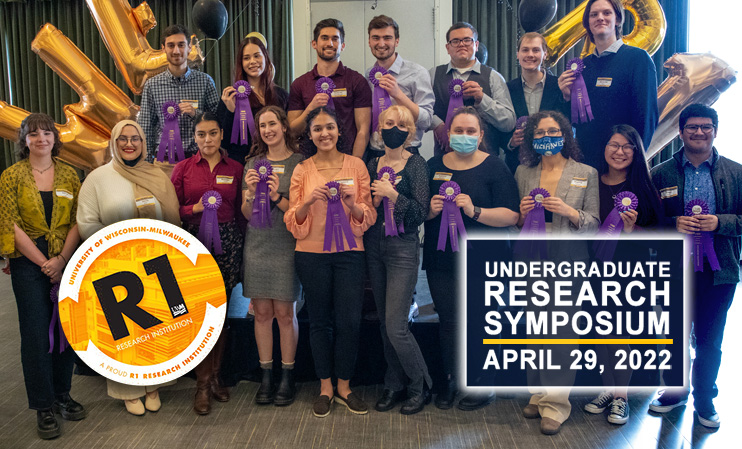
Chancellor Mark Mone puts the credit for UWM’s recognition as a top research institution squarely on the shoulders of all campus researchers.
“You helped address societal issues and fed the bank of solutions and new products,” Mone told the crowd at a research celebration during the annual UWM Undergraduate Research Symposium at the Student Union.
The April 29 event celebrated the third consecutive time that UWM has earned the highest research rating from the Carnegie Classification of Institutions of Higher Education. This “R1” status places UWM among the world’s leading institutions of research – one of only 146 institutions, out of nearly 4,000 considered, that are placed in this category.
“Isn’t it great that we’ve gotten our undergraduate research celebration to piggyback on our R1 celebration?” he asked, donning a gold baseball cap with “R1” emblazoned in it. “How perfect is that?
“It’s important to realize how rare and how hard this achievement is. It doesn’t happen overnight,” Mone said. “And it’s because of your sustained efforts. You’ve made us a better university.”
Eichner awarded 2022-23 Fulbright Research Fellowship
Associate Professor Carolyn Eichner has been awarded a 2022-23 Fulbright Research Fellowship to France (Paris) for her book project The Name: Legitimacy, Identity, and Gendered Citizenship, which analyzes the relationships between personal names, identity, resistance, and state power.
Focusing primarily on France and its empire, the study explores how the modern, imperializing state imposed naming controls, fortifying categories of inclusion and exclusion in order to monitor and regulate its citizens and subjects. It also investigates resistances to the regulation of this both intimate and public aspect of private life, looking specifically at colonial subjects, women, Jews, Muslims, and the aristocracy. The Name traces how governments use naming control to dominate populations. Simultaneously, it shows how people resist control by utilizing the power of naming.
Eichner is author of the books, Feminisms Empire (Cornell University Press, forthcoming 2022), The Paris Commune: A Brief History (Rutgers University Press, 2022), and Surmounting the Barricades: Women in the Paris Commune (Indiana University Press, 2004); French translation, Franchir les barricades: les femmes dans la Commune de Paris (Éditions de la Sorbonne, 2020).
9 UWM undergrads at 2022 Research in the Rotunda
Pictured (from top left): Tien Wong, Nathaniel Tennies, Tristan Jarvey, Isabella Cosentino, Jessie Van Dyck, Sanya Kathuria, Meghan Berger, Mary Widener, David Shaw.
Nine UWM undergraduate students were selected to present outcomes of their research and creative collaborations with UWM faculty at Research in the Rotunda March 9 at the State Capitol in Madison. The annual program features outstanding undergraduate research from across UW System campuses.
The UW System is a national leader in undergraduate research, which contributes to the state’s priorities, including retention, graduation rates, workforce and economic development.
| Stduent name(s) | Project title | Advisor(s) |
|---|---|---|
| Tien Wong, Senior, Computer Science. Co-author: Syam Hasan (dissertator, Mechanical Engineering) |
Analysis of the Friction and Wear Behavior of Graphene-Reinforced Aluminum Metal Matrix Composites using Machine Learning Models | Pradeep Rohatgi, Mechanical Engineering |
| Nathaniel Tennies, Senior, Biological Sciences | Giant KelpeR: A Webapp for Exploratory Analysis of Macrocystis pyrifera Change in Southern-Central California | Filipe Alberto, Biological Sciences |
| Tristan Jarvey, Senior, Psychology | Links Between Exposure to Racial Discrimination, Sleep Disturbances and PTSD Among Black American Adults | Christine Larson, Psychology |
| Isabella Cosentino (Junior) and Jessie Van Dyck (Senior), Architecture. Co-authors: Maysam Abdeljaber, Patrick Finucane, Steven Rasmussen, Luis Ylizaliturri-Fernandez |
Movement Towards Compassion in Architecture | Trudy Watt, Architecture |
| Sanya Kathuria, Senior, Biomedical Sciences | The Effect of Mindfulness Practice on Salivary Cortisol Levels in a Patient Population Undergoing Rotator Cuff Repair | Bhagwant Singh Sindhu, Occupational Science & Technology |
| Meghan Berger (Senior), Art BFA (Design and Visual Communication) and Mary Widener (Senior), Art BFA (Digital Studio Practice) | Working on the World After Us | Nathaniel Stern, Art & Design / Mechanical Engineering |
| David Shaw, Senior, College of General Studies | An Archaeological Survey at the UWM-Waukesha Field Station | Christopher Hays, UWM at Washington County; Gregg Jamison, UWM at Waukesha |
Shevaun Watson is 2022 Fromkin Grant and Lecture recipient
Shevaun Watson, associate professor in UWM’s English department, has been selected to receive the 2022 Morris Fromkin Memorial Grant and Lecture, sponsored by the UWM Libraries.
Watson will present the 53rd annual Fromkin lecture on “The Comforts of Heritage: Tourism, Race, and Public Memory in Charleston, South Carolina” in fall 2022.
About her book project, she writes: “The Comforts of Heritage reveals the complex ways that racism and problematic notions about race in America are promulgated by the heritage tourism industry featuring the South, slavery and the Civil War. The book uncovers a range of consequences of this kind of heritage travel, from the gentrification of tourist areas, to the formation of what I call ‘racialized public memories,’ to the emotional comforts of heritage that continually obscure the historical antecedents of contemporary inequities and injustices.
“Charleston, South Carolina is the focus of my analysis because the story of ‘Historic Charleston,’ in terms of preservation and tourism, is inextricable from the history of race relations in the U.S. . . . . My book argues that the heritage we consume while on vacation directly impacts the public’s sense of shared history, or ‘public memory,’ about race and racism in America, making heritage tourism a social justice issue that demands deeper understanding as a cultural phenomenon.”
Established by Morris Fromkin’s family and supported by an endowment from Fromkin’s grandson, Daniel Soyer, the lecture series, which is dedicated to social justice, is the longest running lecture series on campus.
The 2022 Fromkin Research Grant selection committee included Rachel Baum, Anne Bonds, Rick Popp, Amanda Seligman, Max Yela, and Michael Doylen.
Brookby Foundation gives $1 million for UWM research vessel
The Brookby Foundation has committed $1 million to the University of Wisconsin-Milwaukee in support of the School of Freshwater Sciences’ new research vessel , which will be named the Maggi Sue.
“I am deeply grateful to our friends at the Brookby Foundation for their visionary support of our world’s most precious resource: fresh water,” UWM Chancellor Mark Mone said. “Tens of millions of people rely on the Great Lakes for drinking water, employment, energy production, shipping needs and recreational activities. These bodies of water have a profound effect on our economy and quality of life. The Brookby Foundation has stepped up to help preserve this precious natural resource.”
The Maggi Sue will replace the Neeskay, a converted Korean War-vintage Army T-boat purchased by UWM more than 50 years ago. The new vessel will be the most advanced research vessel ever built for the Great Lakes, with onboard technology featuring sensors that collect real-time data, interchangeable lab pods that can be swapped out based on the needs of the scientists, and a dynamic positioning system that will keep the vessel in place despite currents, wind and waves.
The Maggi Sue will also provide a state-of-the art facility for UWM students in the School of Freshwater Sciences to gain hands-on research experience on the Great Lakes. The vessel will feature wet and dry lab spaces for onboard experiments, a classroom and data visualization lab that will accommodate groups of students of all ages and sleeping accommodations that will allow scientists and crew to remain on the water for longer periods of time, gathering continuous readings without needing to return to shore.
The School of Freshwater Sciences has raised over $13 million toward the $20 million needed to launch the Maggi Sue. Once fundraising is complete, construction of the vessel will take approximately two years. The vessel will be the largest 100% privately funded capital project in UWM’s history.

Founded by Wendy and Paul Greeney and their family, the Brookby Foundation seeks to promote community well-being by supporting artistic and scientific literacy, with a special interest in endeavors that protect or improve the environment. Prior to this gift, the Brookby Foundation provided faculty support related to the School of Freshwater Sciences’ Center for Water Policy, helped establish the school’s outreach office and established the Brookby Scholarships in Water Science Literacy.
“We believe in making a difference where we can,” Wendy and Paul Greeney said in a statement. “That is why we have chosen to make a gift that will advance research and help protect Lake Michigan and all of the Great Lakes. We have a deep appreciation for science, and it’s the responsibility of us all to make the world a better place. Support for the research vessel is how we’re choosing to do that.”

The vessel will be among the tools used by the Freshwater Collaborative of Wisconsin, a partnership of Wisconsin’s 13 public universities and housed at UWM. Through the collaborative, UW System campuses are working together to train the next generation of water researchers and to establish Wisconsin as a global leader in water-related science. The vessel will also be a resource for scientists in Wisconsin, Michigan, Illinois and Indiana conducting work on Lake Michigan, as well as scientists working across the Great Lakes.
“The Brookby Foundation has been a valued partner of the School of Freshwater Sciences for years, and I appreciate the Greeneys’ insightful support of our efforts,” Vice Dean Rebecca Klaper said. “The Great Lakes are incredibly complex systems. So many factors influence the health of these bodies of water, including our rapidly changing climate, invasive species and chemicals that can’t be seen by the naked eye but have a significant and lasting effect on our freshwater ecosystems. The new vessel will enhance our ability to research what’s happening in the Great Lakes and allow us to come up with creative solutions to manage, preserve and protect them for today, as well as for future generations.”
UWM again achieves Carnegie R1 research status
Number of doctorates awarded is major factor
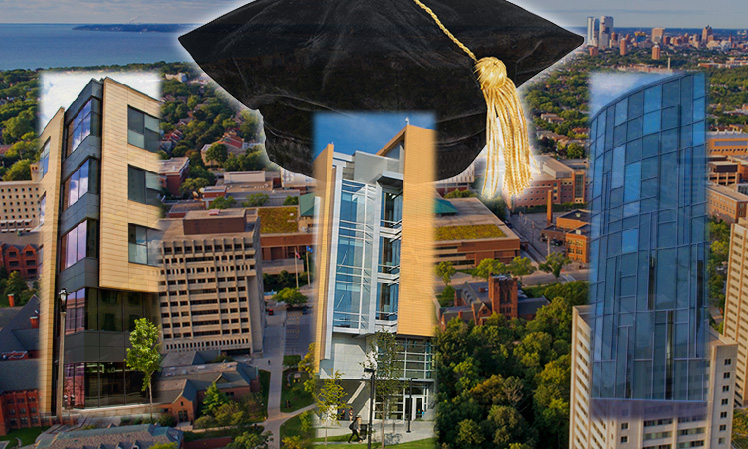 Background image: UWM Kenwood campus. Inset photos (from left): Zilber School of Public Health, Kenwood Interdisciplinary Research Complex, School of Freshwaterr Sciences.
Background image: UWM Kenwood campus. Inset photos (from left): Zilber School of Public Health, Kenwood Interdisciplinary Research Complex, School of Freshwaterr Sciences.The University of Wisconsin-Milwaukee has earned the highest rating for research from the Carnegie Classification of Institutions of Higher Education for a third consecutive time.
The classification places UWM among the world’s leading institutions of research. Just 137 of the 3,298 institutions considered by Carnegie placed in its “highest research activity” (previously “very high research activity”) category, often called R1. UWM is one of just two universities in Wisconsin to achieve R1 status, along with UW-Madison.
UWM previously received an R1 listing in 2015 and 2018. Before that, UWM ranked one tier below, as an R2 doctoral university. The list released Thursday is preliminary. A final list will be announced in January.
“I am elated that UW-Milwaukee has retained its Research 1 status and remains one of the top research universities in the nation,” said UWM Chancellor Mark Mone. “Attaining R1 under any conditions is a monumental feat and is affirmation of the remarkable impact of UWM’s exceptional faculty, staff, doctoral students and researchers who were integral to this ultimate recognition.”
The Carnegie lists, first published in 1973, are issued about every three years.
A leading evaluation
The Carnegie Classification is the leading evaluation of universities’ research activity. The ranking helps attract and retain top research talent among faculty, researchers and graduate students.
Media coverage:
“This reaffirmation of UWM’s R1 status is a tremendous tribute to the outstanding work of particularly our faculty, research staff, and student researchers, particularly at the doctoral level,” said Provost Johannes Britz, the university’s top-ranking academic officer. “UWM’s research and doctoral programs have a profound impact on the region, positioning Milwaukee as an innovation hub.”
Research at UWM permeates all levels of the university and spans dozens of fields, impacting thousands of lives through innovations and discoveries in mental health, sports, the cosmos, science, public health, our environment, advanced manufacturing, the arts and more. Here are just a few examples of the ground-breaking work done at UWM:
- The Milwaukee Institute for Drug Discovery finds and develops drugs that help ease human suffering.
- UWM physicists, who were key players in the discovering of gravitational waves, are finding answers to fundamental questions in the universe.
- Data scientists working in many fields harness big data to solve big problems. As partners in the Northwestern Mutual Data Science Institute, UWM faculty help advance southeastern Wisconsin as a national hub for technology, research, business and talent development.
- The Connected Systems Institute is finding ways to help manufacturers innovate and harness data to run more efficiently.
- Researchers in the School of Freshwater Sciences are finding ways to preserve the health of Lake Michigan, one of the world’s most precious resources.
- Researchers are improving human health, such as Anne Basting finding ways to ease the difficulty of aging and dementia and Melinda Kavanaugh exploring the issue of children having to provide long-term medical assistance to their parents.
More than 100 patents
Research helps fuel the region’s economy and develop its talent pipeline. Researchers hold more than 100 patents and have dozens of license and option agreements through the UWM Research Foundation. Some 20 startup businesses have grown out of UWM research.
And, UWM has one of the nation’s best undergraduate research programs, as recognized by the Council on Undergraduate Education. The program lets students work side by side with world-class faculty, developing practical skills that position them well to enter the job market.
The Carnegie Classification ranks institutions into three categories based on the number of doctoral degrees awarded and the amount of research expenditures during the previous academic year. In fiscal year 2021, UWM had $44.7 million in research expenditures. More than half of that amount—$26.2 million—came from federal agencies.
COVID-19 and intimate partner violence
Lucy Mkandawire-Valhmu (Nursing) and collaborators received a new National Institutes of Health (NIH) Research Project (R01) grant, Impact of the COVID-19 Pandemic on Help Seeking of American Indian and Black Women Experiencing Intimate Partner Violence . This is a four-year R01 from the National Institute of Minority Health and Health Disparities, with a total award of more than $2.3 million.
UWM R01 grant collaborators
| School/College | Collaborator |
|---|---|
| Nursing | Anne Dressel, Pennie Kako, Jennifer Kibicho, Diane Shadewald |
| Public Health | Amanda Simanek, Lorraine Halinka-Malcoe |
| Social Work | James Topitzes |
| Education | Leah Rouse |
Dr. Mkandawire-Valhmu was also recently inducted as a Fellow to the American Academy of Nursing (AAN). She is one of 2,900 fellows worldwide who are experts and leaders in education, management, practice, and research.
Award abstract
Intimate partner violence (IPV) is a complex and pervasive public health problem disproportionately affecting American Indian (AI) and Black women, who ordinarily do not seek help, but who experience the worst health outcomes including homicide. With the ongoing COVID-19 pandemic, help-seeking for AI and Black women has become even more complicated amidst a global concern among advocates that social distancing, quarantine, and isolation measures are inadvertently endangering women experiencing IPV.
To our knowledge, while anecdotal evidence shows that the COVID-19 pandemic has complicated women’s experiences of violence with a possible rise in levels of violence resulting in lethal outcomes, no systematic studies exist that track women’s experiences of IPV during this pandemic.
To address this urgent gap, we propose a community-based participatory research (CBPR) study informed by Indigenous and Black feminist thought, that will employ qualitative and quantitative methods, enabling us to systematically describe the unique and intersecting structural, economic, and interpersonal facilitators and barriers to help-seeking for IPV among AI and Black women in urban and rural areas of Wisconsin during theCOVID-19 pandemic.
We will conduct surveys and individual and focus group interviews with 300 AI and Black women every year for three years to track women’s experiences, patterns of help-seeking, and barriers to help-seeking. Women will be recruited from community- based partner agencies across the state as well as at other sites where our partners ordinarily inform women about their services, in order to capture women seeking help as well as women who have not sought help.
Our ultimate goal through this study is to create a platform where women’s voices can then inform health practice and health policy while also drawing from a community advisory board constituted of advocates and other key members of AI and Black communities in Wisconsin, to provide actionable recommendations for addressing the urgent problem of IPV in the lives of AI and Black women. Our proposed CBPR study is in line with the mission and goals of the National Institute on Minority Health and Health Disparities because it focuses on two populations that are disproportionately affected by the pandemic, while also ordinarily disproportionately impacted by IPV.
Additionally, this CBPR study engages grassroots, community-based agencies with an academic partner (University of Wisconsin-Milwaukee) in scholarship that is grounded in women’s realities, is participatory in nature, and is built upon the capacities and the resilience of community members.
Connecting the central city to suburban jobs
 Lingqian Hu
Lingqian Hu  Robert Schneider
Robert Schneider  Yaidi Cancel Martinez
Yaidi Cancel MartinezJanuary 2022 update

Grant supports new transportation project launching in February.
Lingqian Hu (Urban Planning), Robert Schneider (Urban Planning), Yaidi Cancel Martinez (Urban Planning and Center for Economic Development), and the Southeastern Wisconsin Regional Planning Commission received a $1 million National Science Foundation Civic Innovation Challenge award. Their project, “User-Centered Mobility Solutions (UCMS): A New Vision to Connect Jobs and the Labor Force,” will test a pilot of on-demand microtransit service that aims to connect workers living in segregated, majority-Black neighborhoods in Milwaukee with jobs in suburban employment centers.From September 21, 2021 NSF news release:
In partnership with the U.S. Department of Homeland Security and the U.S. Department of Energy, the U.S. National Science Foundation is announcing $15.9 million in awards to teams comprising civic partners such as local, state, and tribal officials and non-profit and community leaders to conduct and evaluate ready-to-implement pilot projects that address community-identified challenges.Gaps in equality and natural disasters can have a widespread impact, but the effects are seen and felt most sharply at the community level, when neighbors are the ones suffering. The Civic Innovation Challenge is designed to find community-based solutions to these challenges and make them sustainable, scalable and transferrable to other communities—from large to small and from rural to urban—across the US.
Stage 1 of the Civic Innovation Challenge awarded planning grants to 52 teams across 30 states as well as tribal regions, Puerto Rico and Washington, D.C. to refine concepts for projects designed to address use-inspired issues in their communities.In Stage 2, 17 of those teams have been selected for awards of up to $1 million to conduct and evaluate ready-to-implement pilot projects in a 12-month timeframe. Teams will also collaborate across the entire program, sharing approaches and positioning projects to have wider impact.
“We applaud the efforts of all the teams who worked tirelessly to build partnerships between researchers and community stakeholders,” said NSF Director Sethuraman Panchanathan. “We are excited to see the teams selected for the next phase begin their pilot projects and plant seeds of innovation across the country. This program demonstrates the value of research-community partnerships in rapidly translating cutting-edge science into community-based innovation and we look forward to seeing its positive impact across urban and rural communities.”
See entire release .

See the October 6 UWM Report article.
UWM Research Foundation awards 2021 Catalyst Grants
The UWM Research Foundation recently awarded Catalyst Grants to three projects.
Now in its fourteenth year, the Catalyst Grant Program has awarded over $5.5 million in seed funding for 101 projects. These projects have led to 55 issued patents, 31 license/option agreements, and more than $23.4 million in follow-on investments in UWM technologies.
A total of $150,000 is being awarded, thanks to the support of the Lynde and Harry Bradley Foundation. These grants support promising research and development in areas where UWM has the greatest potential to impact the regional economy through commercialization activities.
The award winners are as follows:
Mobile Produced Water Recycling and Resource Recovery System ($50,000)
 Charles Paradis and Josh Swigart
Charles Paradis and Josh SwigartCharles Paradis, Ph.D., Assistant Professor, Dept. of Geosciences Josh Swigart, Ph.D. Candidate, Dept. of Geosciences
Dr. Paradis’s research focuses on the fate, transport, and remediation of contaminants in the environment and groundwater. His background in hydrology and geology makes him an excellent mentor and partner to Josh Swigart, a PhD student who has invented a system to recycle produced water—naturally occurring water that comes out of the ground along with oil and gas. With the Catalyst funds, they will focus on recycling produced water from drilling activities in the 86,000-square-mile Permian Basin—in western Texas and southeastern New Mexico.
The overarching goal is to implement a novel water recycling technique at current deep-well injection stations for water re-sale for hydraulic fracturing, crop watering, potable water for livestock, and for inorganic metals resource recovery. This technique has the potential to allow deep-well injection stations to convert over to water recycling/resource recovery stations in a way that owners can financially benefit from accepting produced water.
Novel Bioreactor for the Removal of Persistent Chemicals from Contaminated Water ($50,000)
 Shangping Xu, Yin Wang, and Erica Young
Shangping Xu, Yin Wang, and Erica YoungShangping Xu, Ph.D., Professor, Geosciences
Yin Wang, Ph.D., Assistant Professor, Civil and Environmental Engineering
Erica Young, Ph.D., Associate Professor, Biological Sciences
Per- and polyfluoroalkyl substances (PFAS) represent a large group of man-made chemicals that are widely used in consumer products—cookware, packaging), airports, and military installations, to name a few. These chemicals do not break down in the environment or in the body, and are known to lead to adverse health outcomes in humans. A growing number of research papers have shown that PFAS contamination in water sources is widespread in the United States.
The goal of this project is to develop highly efficient, cost-effective bioreactors that can bioaccumulate large quantities of PFAS and aid in the removal of PFAS, particularly under challenging environmental conditions. These novel bioreactors can address existing challenges and may be used for the effective removal of PFAS from municipal and industrial wastewater, landfill leachate, groundwater pumped from PFAS pollution flumes, and discharge from membrane filtration systems.
3D Printing of Graphene Reinforced Nanocomposites ($50,000)
 Pradeep Rohatgi
Pradeep RohatgiPradeep Rohatgi, Ph.D., Distinguished Professor, Materials Science and Engineering Additive manufacturing has the potential to transform manufacturing as we know it, bringing production closer to demand and sustainability with its design freedom. Throughout industrial manufacturing, there is an increasing need for high performance materials as designers are moving away from conventional metals and standard materials. Graphene, a carbon-based material, has one of the highest strengths among the currently available reinforcements. Achieving the right ratios of graphene in the aluminum matrix is challenging and has not been possible to date with current techniques.
Dr. Rohatgi’s work will help develop a technology to produce graphene-reinforced nanocomposites that are ultralight, high strength, and high-temperature resistant. His work will enable industry manufacturing of high-perfomance materials that can be used in a range of applications including automotive, aerospace, and military.
Unprecedented clean-energy grant from DOE
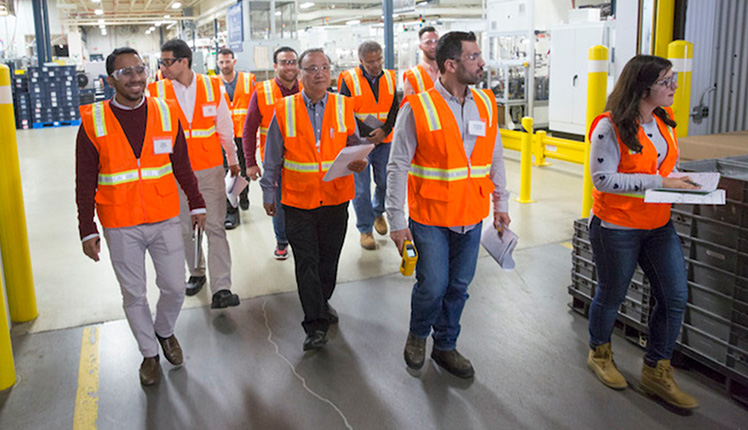 Engineering Professor Ryo Amano (center), who directs the federally funded UWM Industrial Assessment Center, tours the Milwaukee plant of Husco International with his student evaluators.
Engineering Professor Ryo Amano (center), who directs the federally funded UWM Industrial Assessment Center, tours the Milwaukee plant of Husco International with his student evaluators.
- See the August 4 UWM Report article.
- See the August 26 CEAS article.
The U.S. Department of Energy has awarded funding to the University of Wisconsin-Milwaukee to operate an Industrial Assessment Center, which offers free evaluations to manufacturers and wastewater treatment plants to help them reduce waste, save energy and reduce carbon emissions.
The Industrial Assessment Center at UWM, one of 32 nationwide and the only one in Wisconsin, also trains the next generation of energy-engineering professionals, because the assessments are carried out by UWM students.
Engineering Professor Ryo Amano (center), who directs the federally funded UWM Industrial Assessment Center, tours the Milwaukee plant of Husco International with his student evaluators.
UWM has operated the Department of Energy-supported center for most of the last 28 years. Because of UWM’s long history of IAC operation, DOE officials recommended UWM as a site for Vice President Kamala Harris’ May 2021 visit to promote the American Jobs Plan in Wisconsin.
The Department of Energy has committed $60 million over the next five years to support the Industrial Assessment Centers. A key strategic goal of the new funding is helping companies to reach net-zero emissions no later than 2050.
Nine to receive 2020-2021 Research Recognition Awards
 From top left: Ira Driscoll, Carolyn Eichner, Clark Evans, Nicolas Silvaggi. 2nd row: Anne Basting, Bonnie Klein-Tasman, Chia Vang, Elana Levine, Mark Netzloff.
From top left: Ira Driscoll, Carolyn Eichner, Clark Evans, Nicolas Silvaggi. 2nd row: Anne Basting, Bonnie Klein-Tasman, Chia Vang, Elana Levine, Mark Netzloff.
- Read awardee bios on the Research Recognition Awardees page.
- Read more about the awards on the Internal Grant Programs page.
Nine UWM faculty members have been chosen to receive the 2020-2021 Research Recognition Awards. They will be honored at the Fall Awards Ceremony October 13.
Office of Research/UWM Foundation Research Awards
These awards recognize and encourage UWM assistant and associate professors who have shown the potential to achieve distinction in their academic disciplines through scholarship, creative activity, and the dissemination of knowledge.
| Awardee | Department |
|---|---|
| Ira Driscoll | Psychology |
| Carolyn Eichner | History |
| Clark Evans | Mathematics |
| Nicolas Silvaggi | Chemistry |
UWM Research Foundation Senior Faculty Awards
These awards recognize researchers who have a long history of significant contributions to their field of research. Unlike the Office of Research/UWM Foundation Research Awards which recognize assistant and associate professors, all research faculty members, except UWM Distinguished Professors, are eligible for these awards.
| Awardee | Department |
|---|---|
| Anne Basting | English |
| Bonnie Klein-Tasman | Psychology |
| Chia Vang | History |
Research in the Humanities Award
These biennial awards recognize outstanding scholarship and research in the humanities—specifically, the Departments of Africology; Art History; Communication; English; Foreign Languages and Literature; French, Italian, and Comparative Literature; History; Journalism, Advertising, and Media Studies; Linguistics; Philosophy; and Spanish and Portuguese. Recipients have demonstrated a comprehensive grasp of the subject(s) of inquiry and research and made a substantive contribution to humanistic thought through a monograph or other scholarly publication during the two years prior to the award year.
| Awardee | Department |
|---|---|
| Elana Levine | English |
| Mark Netzloff | English |
UWM astrophysicists excel
UWM researchers take leading role in first black hole-neutron star collision detection

For the first time, researchers have confirmed the detection of a collision between a black hole and a neutron star. In fact, the scientists detected not one but two such events occurring just 10 days apart in January 2020.
The extreme events made splashes in space that sent gravitational waves rippling across at least 900 million light-years to reach Earth. In each case, the neutron star was likely swallowed whole by its black hole partner.
The discovery was made by an international team of scientists that includes 22 members of UWM’s Center for Gravitation, Cosmology and Astrophysics.
Gravitational waves are disturbances in the curvature of space-time created by massive objects in motion. During the five years since the waves were first measured, a finding that led to the 2017 Nobel Prize in Physics, researchers have identified more than 50 gravitational-wave signals from the merging of pairs of black holes and of pairs of neutron stars. Both black holes and neutron stars are the corpses of massive stars, with black holes being even more massive than neutron stars.
Funding renewed for NANOGrav center, which includes UWM

An international team of astronomers, including several from UWM, have renewed funding from the National Science Foundation for their work in detecting and characterizing low-frequency gravitational waves, a transformational challenge in astrophysics.
The NSF has awarded a $17 million grant over five years to the North American Nanohertz Observatory for Gravitational Waves (NANOGrav) for operation of the NANOGrav Physics Frontiers Center (PFC).
The low-frequency gravitational-wave detectors used by NANOGrav PFC are millisecond pulsars—rapidly spinning, superdense remains of massive stars that have exploded as supernovas. These ultra-stable stars are nature’s most precise celestial clocks, appearing to “tick” every time their beamed emissions sweep past the Earth, like the beacon on a lighthouse. Gravitational waves cause small but detectable fluctuations in the measured arrival times of the radio pulses on Earth.
5 startups earn UWM Research Foundation bridge grants
Five UWM startup companies have been awarded the first round of funding from the UWM Research Foundation’s new bridge grant program, which leverages a $200,000 matching grant from the Wisconsin Economic Development Corporation that was announced last year. The funding will support UWM startups that are managed by faculty, students or staff that have licensed intellectual property from the Research Foundation. This “gap” funding is meant to compensate for the shortage of capital for university-based innovations.
Through donations from individuals and donors such as Bader Philanthropies and Clarios, the Research Foundation has raised just over half of their portion, and plan to award the remaining match, phase II, in early 2022.
Each of the following—five of UWM’s 15 launched campus startups—has been awarded up to $25,000 through the program.

COnovate Inc., formerly SafeLi, was co-founded by Carol Hirschmugl and Marija Gajdardziska-Josifovska. With the funding, the researchers are applying a novel, carbon-based nanomaterial that they discovered to lithium-ion batteries. When used in the batteries’ anode, the material boosts performance and safety of the batteries compared to current technology. Estrigenix Therapeutics Inc. is a collaboration among Karyn Frick (UWM), William Donaldson (Marquette University), and Dan Sem (Concordia University). The company’s goal is to develop and commercialize first-in-class therapeutics to treat hot flashes and memory dysfunction in menopausal women. The startup aims to develop and license a molecule-compound to a pharmaceutical partner. Pantherics Incorporated was originally founded by Douglas Stafford and Alexander “Leggy” Arnold. The company focuses on developing and commercializing novel therapeutics for chronic inflammation. The company’s lead drug compound is being developed as an oral medication that will replace inhalers for reducing lung inflammation in persistent asthma. RoddyMedical LLC is headquartered in the UWM Innovation Campus and headed by nursing doctoral student Lindsey Roddy. The company’s SafeMover is a single-use device designed to organize and secure different types of medical tubes and cords to improve IV medication safety and eliminate hazardous cord dislodgement.
Co-founded by Ching Hong Yang, T3 BioScience LLC is commercializing non-antibiotic agricultural products that protect crops from infection by harmful bacteria and fungus. It has shown that its lead product, RejuAgro, is more effective than antibiotics currently being used by farmers to protect against crop infection.
Distinguished Professorships
UWM Distinguished Professors have a significant impact on their fields of study. With remarkable productivity, international reputations, and glowing testimonials from peers, UWM Distinguished Professors continue to make significant scholarly contributions to their disciplines. Of the 57 professors who have achieved this status since 1973, 31 remain on the faculty, continuing their leadership role at UWM. The Office of Research also maintains information on the selection, roles, and responsibilities of UWM Distinguished Professors (PDF), and the Historical List of Distinguished Professors.
Discovery and Innovation Grant (DIG)
The Discovery and Innovation Grant (DIG) (formerly RGI) is a competitive internal seed funding program that supports high-quality, innovative research by investing in projects selected through an independent and objective process.
Advancing Research and Creativity (ARC) program
(Formerly RACAS) Advancing Research and Creativity (ARC) is an internal research funding program for projects in all disciplines and at any stage of development. Funded work must be completed within a 12- to 18-month timeline. Awards are expected to result in scholarly, scientific, and artistic outcomes. The review process uses internal and external reviewers.

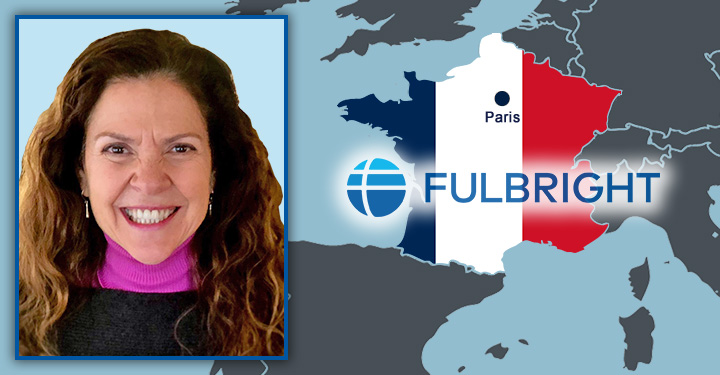
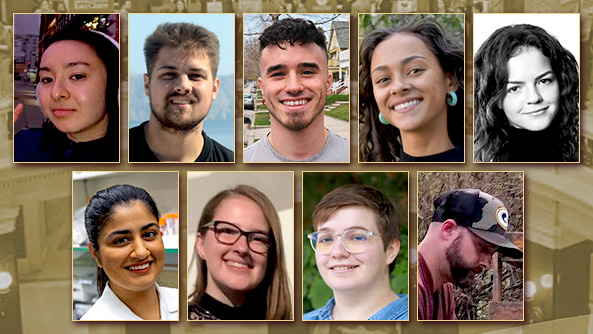
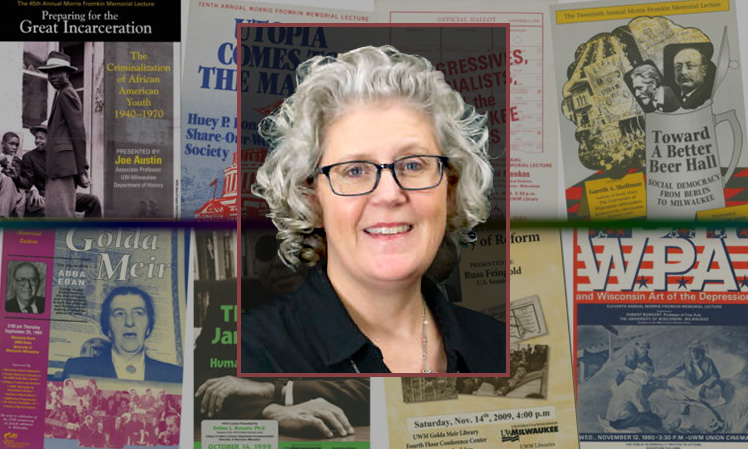

 See December 16 UWM Report article.
See December 16 UWM Report article.